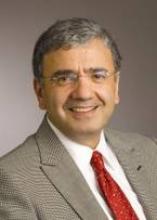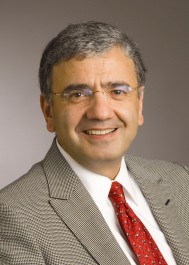User login
Rising practice costs are driving an increasing number of cardiologists to trade solo practices for hospital employment, according recent findings from the American College of Cardiology. A survey of more than 2,500 practices nationwide showed that the number of hospital-employed cardiologists tripled from 2007 to 2011, from 8% to 24%. Meanwhile, physician-owned practices declined from 73% to 60% during that same period. Dr. William Zoghbi, ACC president, said rising costs of private practice are driving the trends.
"The major driver for this shift is the reduction in payment," Dr. Zoghbi said in an interview. "This is concerning for us because we would like a physician workforce that is diversified in the way they practice. ... It gives individual choice, and at times you have access issues that may be a problem, particularly in suburban areas or in rural areas," said Dr. Zoghbi, chief of cardiovascular imaging at Methodist DeBakey Heart and Vascular Center in Houston. Cuts to Medicare reimbursement and overall reimbursement are the primary concern for more than 70% of cardiologists nationwide, according to survey findings.
"Reductions in payments have made it unsustainable for individuals to stay in private practice. It’s just much more hassle and uncertainty," Dr. Zoghbi said. "We have to look for other ways to reimburse physicians, and for payment models that particularly emphasize value and quality so we can incentivize individuals to be less volume driven and more quality driven while at the same time thinking of payments that are sustainable for individuals to do that."
Other top challenges to practices are billing and coding (42%), expense management (39%), and implementing health IT (29%). Dr. Zoghbi added that it’s up to Congress to ease the burden.
"Congress must eliminate the red tape so that physicians can focus on patients and not paperwork. We are doing our part to ensure access to high-quality, cost-effective, and patient-centered care. Now it’s time for Congress to do the same," Dr. Zoghbi said.
Rising practice costs are driving an increasing number of cardiologists to trade solo practices for hospital employment, according recent findings from the American College of Cardiology. A survey of more than 2,500 practices nationwide showed that the number of hospital-employed cardiologists tripled from 2007 to 2011, from 8% to 24%. Meanwhile, physician-owned practices declined from 73% to 60% during that same period. Dr. William Zoghbi, ACC president, said rising costs of private practice are driving the trends.
"The major driver for this shift is the reduction in payment," Dr. Zoghbi said in an interview. "This is concerning for us because we would like a physician workforce that is diversified in the way they practice. ... It gives individual choice, and at times you have access issues that may be a problem, particularly in suburban areas or in rural areas," said Dr. Zoghbi, chief of cardiovascular imaging at Methodist DeBakey Heart and Vascular Center in Houston. Cuts to Medicare reimbursement and overall reimbursement are the primary concern for more than 70% of cardiologists nationwide, according to survey findings.
"Reductions in payments have made it unsustainable for individuals to stay in private practice. It’s just much more hassle and uncertainty," Dr. Zoghbi said. "We have to look for other ways to reimburse physicians, and for payment models that particularly emphasize value and quality so we can incentivize individuals to be less volume driven and more quality driven while at the same time thinking of payments that are sustainable for individuals to do that."
Other top challenges to practices are billing and coding (42%), expense management (39%), and implementing health IT (29%). Dr. Zoghbi added that it’s up to Congress to ease the burden.
"Congress must eliminate the red tape so that physicians can focus on patients and not paperwork. We are doing our part to ensure access to high-quality, cost-effective, and patient-centered care. Now it’s time for Congress to do the same," Dr. Zoghbi said.
Rising practice costs are driving an increasing number of cardiologists to trade solo practices for hospital employment, according recent findings from the American College of Cardiology. A survey of more than 2,500 practices nationwide showed that the number of hospital-employed cardiologists tripled from 2007 to 2011, from 8% to 24%. Meanwhile, physician-owned practices declined from 73% to 60% during that same period. Dr. William Zoghbi, ACC president, said rising costs of private practice are driving the trends.
"The major driver for this shift is the reduction in payment," Dr. Zoghbi said in an interview. "This is concerning for us because we would like a physician workforce that is diversified in the way they practice. ... It gives individual choice, and at times you have access issues that may be a problem, particularly in suburban areas or in rural areas," said Dr. Zoghbi, chief of cardiovascular imaging at Methodist DeBakey Heart and Vascular Center in Houston. Cuts to Medicare reimbursement and overall reimbursement are the primary concern for more than 70% of cardiologists nationwide, according to survey findings.
"Reductions in payments have made it unsustainable for individuals to stay in private practice. It’s just much more hassle and uncertainty," Dr. Zoghbi said. "We have to look for other ways to reimburse physicians, and for payment models that particularly emphasize value and quality so we can incentivize individuals to be less volume driven and more quality driven while at the same time thinking of payments that are sustainable for individuals to do that."
Other top challenges to practices are billing and coding (42%), expense management (39%), and implementing health IT (29%). Dr. Zoghbi added that it’s up to Congress to ease the burden.
"Congress must eliminate the red tape so that physicians can focus on patients and not paperwork. We are doing our part to ensure access to high-quality, cost-effective, and patient-centered care. Now it’s time for Congress to do the same," Dr. Zoghbi said.

